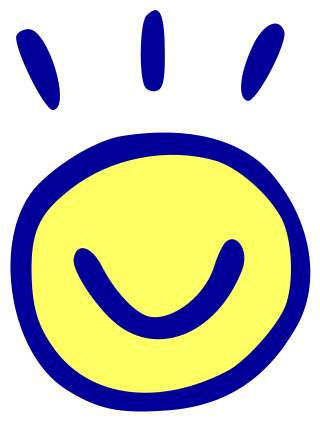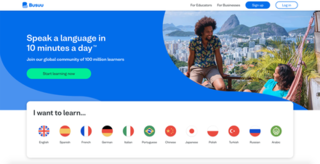The Klingon language is the constructed language spoken by a fictional alien race called the Klingons, in the Star Trek universe.
Lexicography is the study of lexicons, and is divided into two separate academic disciplines. It is the art of compiling dictionaries.

Wiktionary is a multilingual, web-based project to create a free content dictionary of terms in all natural languages and in a number of artificial languages. These entries may contain definitions, images for illustration, pronunciations, etymologies, inflections, usage examples, quotations, related terms, and translations of terms into other languages, among other features. It is collaboratively edited via a wiki. Its name is a portmanteau of the words wiki and dictionary. It is available in 190 languages and in Simple English. Like its sister project Wikipedia, Wiktionary is run by the Wikimedia Foundation, and is written collaboratively by volunteers, dubbed "Wiktionarians". Its wiki software, MediaWiki, allows almost anyone with access to the website to create and edit entries.
Language education – the process and practice of teaching a second or foreign language – is primarily a branch of applied linguistics, but can be an interdisciplinary field. There are four main learning categories for language education: communicative competencies, proficiencies, cross-cultural experiences, and multiple literacies.

Ottoman Turkish was the standardized register of the Turkish language used by the citizens of the Ottoman Empire. It borrowed extensively, in all aspects, from Arabic and Persian, and its speakers used the Ottoman Turkish alphabet for written communication. During the peak of Ottoman power, words of foreign origin in Turkish literature in the Ottoman Empire heavily outnumbered native Turkish words, with Arabic and Persian vocabulary accounting for up to 88% of the Ottoman vocabulary in some texts.
Business English is a part of English for specific purposes and can be considered a specialism within English language learning and teaching, or a variant of international English. Many non-native English speakers study the subject with the goal of doing business with English-speaking countries, or with companies located outside the English-speaking world but which nonetheless use English as a shared language or lingua franca. Much of the English communication that takes place within business circles all over the world occurs between non-native speakers. In cases such as these, the object of the exercise is efficient and effective communication. The strict rules of grammar are in such cases sometimes ignored, when, for example, a stressed negotiator's only goal is to reach an agreement as quickly as possible.

The Klingon Dictionary (TKD) is a book by Marc Okrand describing the Klingon language. First published in 1985 and then again with an addendum in 1992, it includes pronunciation, grammar and vocabulary. It has sold more than three hundred thousand copies and has been translated into five languages.

Rosetta Stone Language Learning is proprietary, computer-assisted language learning (CALL) software published by Rosetta Stone Inc, part of the IXL Learning family of products. The software uses images, text, and sound to teach words and grammar by spaced repetition, without translation. Rosetta Stone calls its approach Dynamic Immersion.
The Dholuo dialect or Nilotic Kavirondo, is a dialect of the Luo group of Nilotic languages, spoken by about 4.2 million Luo people of Kenya and Tanzania, who occupy parts of the eastern shore of Lake Victoria and areas to the south. It is also spoken by millions in Uganda, South Sudan, and Ethiopia. It is used for broadcasts on KBC.
A foreign language writing aid is a computer program or any other instrument that assists a non-native language user in writing decently in their target language. Assistive operations can be classified into two categories: on-the-fly prompts and post-writing checks. Assisted aspects of writing include: lexical, syntactic, lexical semantic and idiomatic expression transfer, etc. Different types of foreign language writing aids include automated proofreading applications, text corpora, dictionaries, translation aids and orthography aids.
Grammatical Framework (GF) is a programming language for writing grammars of natural languages. GF is capable of parsing and generating texts in several languages simultaneously while working from a language-independent representation of meaning. Grammars written in GF can be compiled into a platform independent format and then used from different programming languages including C and Java, C#, Python and Haskell. A companion to GF is the GF Resource Grammar Library, a reusable library for dealing with the morphology and syntax of a growing number of natural languages.
Harold Edward Palmer, usually just Harold E. Palmer, was an English linguist, phonetician and pioneer in the field of teaching English as a second language. Especially he dedicated himself to Oral Method. He stayed in Japan for 14 years and reformed its English education. He contributed to the development of the applied linguistics of the 20th century.

Toki Pona is a philosophical artistic constructed language known for its small vocabulary, simplicity, and ease of acquisition. It was created by Sonja Lang, a Canadian linguist and translator, to simplify thoughts and communication. The first drafts were published online in 2001, while the complete form was published in the book Toki Pona: The Language of Good in 2014. Lang also released a supplementary dictionary, the Toki Pona Dictionary, in July 2021, based on community usage.
Livemocha was an online language learning community based in Seattle, Washington. It provided instructional materials in 38 languages and a platform for speakers to interact with and help each other learn new languages. According to the site, it had approximately 12 million registered members from 196 countries around the globe. It was free to join and use; however, it offered the option to pay for various benefits. In 2012, 400,000 users visited the site daily.

Busuu is a language learning platform on web, iOS and Android that allows users to interact with native speakers. In 2021, Chegg acquired Busuu for $436 million.

Lojban is a logical, constructed, human language created by the Logical Language Group which aims to be syntactically unambiguous. It succeeds the Loglan project.
Before You Know It is language acquisition software package that listens to students and gives them detailed feedback on their pronunciation. There is also freeware for both Windows and Mac OS X which does not check pronunciation. Paid versions present continuous text, which can be used in various ways. The freeware version uses a flashcard software system. Courses were available in over 70 languages. Courses branded as Byki were produced by Transparent Language Online, which still produces courses under that and other names.

Hokkien, a Min Nan variety of Chinese spoken in Southeastern China, Taiwan and Southeast Asia, does not have a unitary standardized writing system, in comparison with the well-developed written forms of Cantonese and Vernacular Chinese (Mandarin). In Taiwan, a standard for Written Hokkien has been developed by the Republic of China Ministry of Education including its Dictionary of Frequently-Used Taiwan Minnan, but there are a wide variety of different methods of writing in Vernacular Hokkien. Nevertheless, vernacular works written in Hokkien are still commonly seen in literature, film, performing arts and music.
English Profile is an interdisciplinary research programme designed to enhance the learning, teaching and assessment of English worldwide. The aim of the programme is to provide a clear benchmark for progress in English by clearly describing the language that learners need at each level of the Common European Framework of Reference for Languages (CEFR). By making the CEFR more accessible, English Profile will provide support for the development of curricula and teaching materials, and in assessing students' language proficiency.
Smigin is a conversation-based language learning platform available online and as a mobile application for iOS and Android. As of March 2016, Smigin has two products: Smigin, a language-learning website and Smigin Travel, a mobile translation app. Smigin's language learning site offers 4 different destination languages across 3 source languages, with several languages in development. Smigin Travel, exclusively designed for the mobile interface, is available on iOS and Android in 11 languages with users in over 175 countries.







